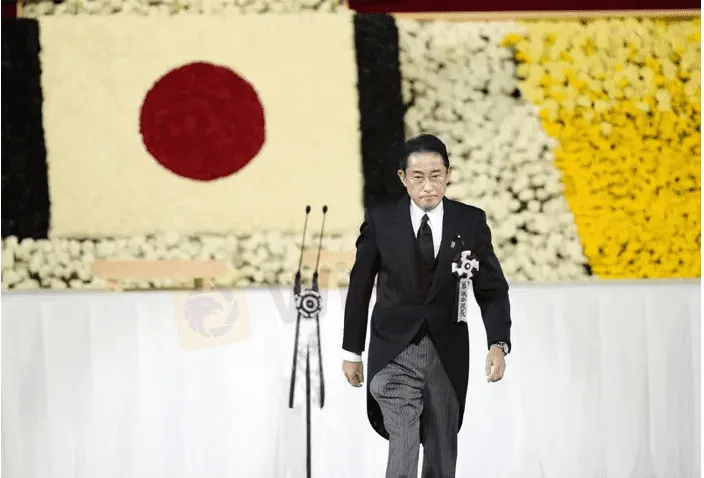简体中文
繁體中文
English
Pусский
日本語
ภาษาไทย
Tiếng Việt
Bahasa Indonesia
Español
हिन्दी
Filippiiniläinen
Français
Deutsch
Português
Türkçe
한국어
العربية
Japan PM Kishida vows new steps to beat inflation as approval ratings slide
Abstract:Japanese Prime Minister Fumio Kishida on Monday vowed to take steps to cushion the blow from rising electricity bills and maximise the benefits to the economy from a weak yen such as by resuscitating inbound tourism.

Japanese Prime Minister Fumio Kishida on Monday vowed to take steps to cushion the economic blow from rising inflation and boost inbound tourism to maximise the benefits from a weak yen, in a fresh attempt to prop up his sliding approval ratings.
Dealing with rising living costs and the fallout from the yens recent sharp falls will be among steps the administration will focus on, Kishida said in a policy speech to parliament, stressing that revitalising the economy was his “top priority.”
“A big challenge Japan will face toward next spring is the risk of a sharp rise in electricity bills. We will take unprecedented, bold measures that directly ease the burden on households and companies,” he said.
The government will compile a package of measures by the end of this month to ease the pain from rising inflation, he added.
A year since becoming prime minister, Kishida has seen his popularity plunge due to revelation of his ruling party‘s ties with a controversial religious party. He is also under pressure to ease the pain from a weak yen, which boosts exporters’ profits but hurts households by inflating the cost of importing already expensive raw material prices.
A poll by the Asahi newspaper showed on Monday that disapproval for Kishidas administration rose to 50% in October from 47% in September, exceeding the approval rate of 40%.
As part of measures to boost the benefits from a weak yen, Kishida said Japan will fully open borders to overseas visitors from Oct. 11 to revitalise inbound tourism.
“We will powerfully pursue policy measures to maximise the benefits of a weak yen,” with a target of having foreign tourists spend over 5 trillion yen ($35 billion) in Japan annually, he said.
Attracting chip and battery plants, and promoting exports of agriculture products would also be among the steps Japan would take to gain from the weak yen, Kishida said.
Japan‘s core consumer inflation hit 2.8% in August, exceeding the central bank’s 2% target for a fifth straight month, as price pressure from raw materials and the weak yen broadened.
Keen to keep supporting a fragile economy, the Bank of Japan has shown no intention of tweaking its ultra-low interest rates that are driving down the yen.
The government intervened in the foreign exchange market last month to prop up the yen, and hopes to mitigate households pain from rising prices with subsidies and pay-outs.
But analysts doubt whether Kishidas spending plan would help revitalise the economy, or his falling popularity.
“Kishida is paying the price for putting off important decisions on economic and energy policies,” said Yasuhide Yajima, chief economist at NLI Research Institute in Tokyo.
“His ruling party has failed to push through structural reforms. Thats making it difficult to address problems now being exposed by the COVID-19 pandemic and the weak yen.”

Disclaimer:
The views in this article only represent the author's personal views, and do not constitute investment advice on this platform. This platform does not guarantee the accuracy, completeness and timeliness of the information in the article, and will not be liable for any loss caused by the use of or reliance on the information in the article.
Read more

CySEC Revokes UFX Broker Licence as Reliantco Halts Global Operations
The Cyprus Securities and Exchange Commission (CySEC) has officially withdrawn the Cyprus Investment Firm (CIF) licence of Reliantco Investment Limited, the operator of UFX.com. This decision followed a six-month period during which the company failed to provide any investment services or perform investment activities.

Elon Musk Sparks Debate Over Presidential Power and Federal Reserve Independence
Elon Musk has voiced his support for the controversial idea that United States presidents should have a role in shaping Federal Reserve policies. This endorsement aligns with recent remarks from President-elect Donald Trump, who has hinted at revisiting the central bank's independence, a long-held tradition in the nation's financial governance.

Consob Sounds Alarm: WhatsApp & Telegram Users Vulnerable to Investment Scams
Italy's financial regulator, Consob, has raised alarms over an increase in fraudulent schemes targeting investors through mobile messaging platforms such as WhatsApp and Telegram.

Crypto 101: Coins vs Tokens
For those new to the world of cryptocurrency, terms like "coin" and "token" may seem interchangeable. However, understanding the distinction between these two digital assets is crucial for navigating the crypto landscape. Both coins and tokens serve as integral components of blockchain ecosystems, yet they differ in their functionalities, use cases, and the technologies underpinning them.
WikiFX Broker
Latest News
Tokyo Police Arrest 4 for Unregistered FX Trading Scheme
BSP Shuts Down Uno Forex Over Serious AML Violations
ACY Securities Expands Global Footprint with South Africa Acquisition
Rupee gains against Euro
WikiEXPO Global Expert Interview: The Future of Financial Regulation and Compliance
DFSA Warns of Fake Loan Approval Scam Using Its Logo
Consob Sounds Alarm: WhatsApp & Telegram Users Vulnerable to Investment Scams
CySEC Revokes UFX Broker Licence as Reliantco Halts Global Operations
Bitcoin ETF Options Get Closer to Reality with CFTC Clarification
Peso Depreciation to 59:$1 Likely Amid Strong Dollar Surge
Currency Calculator


